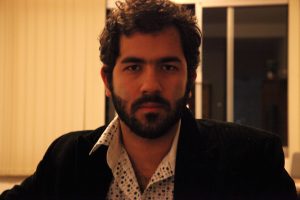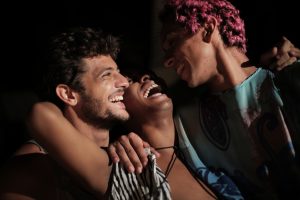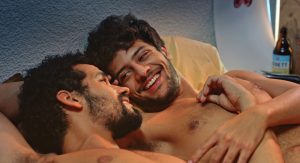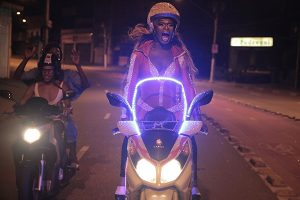Revealing the BODY ELECTRIC

Director Marcelo Caetano
BODY ELECTRIC is a boudoir film. With each bed Elias lies in, a new universe opens from the narratives told by the characters. Bodies embracing and caressing each other, voices that speak softly and quietly, lovers who tell of their encounters, sexual adventures and dreams. My desire was to address love as something serial and repetitive, portraying a kind of affection that distances itself from romantic love and its already soiled conflicts.

Elias loves in a lightly, solar and anarchic way. He is 23 years old, openly gay, a migrant from north-eastern Brazil. He uses each encounter to shape his personality by becoming a kind of human prism, capturing what he can from his partners. He changes his colour, and transitions between the masculine and the feminine. He can be a committed worker, but also a mocking anarchist. In this way, the film questions the socially established places for gay people, black people, immigrants, and workers. My aim is always to seek the individual, avoiding the discourse of identity that tries to capture and classify everybody.

BODY ELECTRIC is also a Bildungsroman. Elias comes into adulthood with great difficulty while trying to balance his personal pleasure with professional life. He is resistant to some conflicts simply because he does not believe in the high value that professional success and marital happiness have in our society. For him it is necessary to grow on his journey. I love filming these encounters and I love them more, the more unlikely they are. Perhaps the film’s most prominent political face is resisting intolerance by building links between socially distant people.
The film is influenced by Walt Whitman’s poem I SING THE BODY ELECTRIC in which the American author celebrates the beauty of bodies, regardless of age, gender, colour and form. I was also very touched by cinema of the 60’s and 70’s, especially the relation between word and image that I found in the poetic cinema of Pasolini and Joaquim Pedro de Andrade. The choice of words and the strength of the narration are structural to me. This is how I found the way to speak of these bodies, this group of workers, and Elias is my spokesman: Like Scheherazade in ONE THOUSAND AND ONE NIGHTS, he recounts his adventures as if he wanted, by the seduction of the story, to postpone the end of his youth.
Marcelo Caetano

Related Articles
- Pride and Protest
- Campbell X and THE WATERMELON WOMAN
- Scorsese, Pio and making THE CIAMBRA
- REINVENTING MARVIN – The Origins
- Being DISCREET with director Travis Mathews
- MARIO a revealing look at homosexuality in The Beautiful Game.
- Meet the Amatos – with THE CIAMBRA Director Jonas Carpignano
- Tamara Shogaolu talks about HALF A LIFE from Boys on Film 18: Heroes
- All about “Buddy”, in Boys on Film 18: Heroes.
- It’s All About Frankie from BEACH RATS
